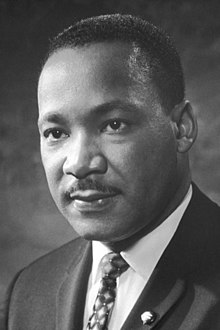
Martin Luther King%2C Jr..
(Image by Wikipedia (commons.wikimedia.org), Author: Nobel Foundation) Details Source DMCA
Duluth, Minnesota (OpEdNews) June 19, 2023: Slavery has been described as America's Original Sin. In the spirit of celebrating Juneteenth 2023, I want to offer here some further reflections on the thought of the American Baptist minister and activist the Reverend Dr. Martin Luther King, Jr. (1929-1968: Ph.D. in theology, Boston University, 1955) in his last book, Where Do We Go from Here: Chaos or Community? (Harper & Row, 1967), in which he discusses "Racism and White Backlash" in Chapter III (pp. 71-107).
In King's bleak-sounding Chapter III, he understandably lashes out at "the myth of the superior race" and the "doctrine of white supremacy" (p. 77). He laments that '[i]n 1863 the Negro was given abstract freedom expressed in luminous rhetoric. But in the agrarian economy [of the time], he was given no land to make liberation concrete" (p. 84). He also laments that "the still ambivalent nation in 1954 declared school segregation unconstitutional with no plan or program to make integration real" (p. 85).
In King's Chapter II: "Black Power" (pp. 23-69), in which he skillfully defends his philosophy of non-violence, he laments that segregated schools for Negroes, prior to the U.S. Supreme Court ruling in Brown v. Board of Education in 1954, turned out "children by the thousands finishing high school who can only read at a sixth-grade level" (p. 57) - in other words, their Negro teachers socially promoted those Negro children.
I agree that this was a lamentable situation; but I do not see how desegregation as such would address this problem. Please do not misunderstand me here. I am not arguing against desegregation. Rather, I am picking up on King's emphasis in Chapter III on having a "program to make integration real."
For my own admittedly modest contribution to the discussion of the education of Negro children, see my OEN article "An Open Letter to the Honorable Jerry Brown, Governor of California" (dated September 15, 2015):
Now, in addition, in King's Chapter III (pp. 89-90), he quotes and discusses the Swedish economist Gunnar Myrdal's massive, nearly 1,500-page, 1944 study titled An American Dilemma: The Negro Problem and Democracy (Harper & Brothers):
"[Myrdal says in 1944, pp. 1021-1022:] 'The Negro problem is not only America's greatest failure but also America's incomparably great opportunity for the future. If America should follow its own deepest convictions, its well-being at home would be increased directly. At the same time America's prestige and power abroad would rise immensely. The centuries-old dream of American patriots, that America should give to the entire world its own freedoms and its own faith, would come true. America can demonstrate that justice, equality and cooperation are possible between white and colored people. . . . America is free to choose whether the Negro shall remain her liability or become her opportunity.'
"[King says in 1967:] This is white America's most urgent challenge today. If America is to respond creatively to the challenge, many individuals, groups and agencies must rise above the hypocrisies of the past and begin to take an immediate and determined part in changing the face of the nation. If the country has not yet emerged with a massive program to end the blight surrounding the plight the life of the Negro, one is forced to believe that the answers have not been forthcoming because there is as yet no genuine and widespread conviction that such fundamental changes are needed, and needed now" (the ellipsis and the italics are in King's text).
Now, as the reference to "Democracy" in Myrdal's subtitle hints, the "Dilemma" referred to in his main title refers to what he refers to in his text as the "American creed." In brief, the "Dilemma" refers to the fact that America as of 1944 was not living up to the "American creed" - and America as of 1967 was still not living up to the "American creed." No doubt America has since 1967 made some headway in tending to live up to the "American creed" - in the sense that the most egregious practices under Jim Crow laws and customs in the South have been countered and continue to be countered, despite the worrisome rise of white Christian nationalism.
For further discussion of Myrdal's 1944 study, see the Wikipedia entry about it.
Wikipedia has a somewhat lengthy entry of "White nationalism." It includes a subsection titled "2016 Trump presidential campaign." But the entry does not explicitly refer to white Christian nationalism.
However, Philip S. Gorski of Yale University and Samuel L. Perry of the University of Oklahoma do explicitly discuss white Christian nationalism in their 2022 book The Flag and the Cross: White Christian Nationalism and the Threat to American Democracy (Oxford University Press) - with special attention to the last three decades (emphasizing the decades following Robert C. Christopher's 1989 book Crashing the Gates: The De-WASPing of America's Power Elite [Simon & Schuster]).
Now, in King's Chapter III of his 1967 book, he makes it clear that he himself subscribes to the "American creed." In chapter III, he says the following:
(Note: You can view every article as one long page if you sign up as an Advocate Member, or higher).




